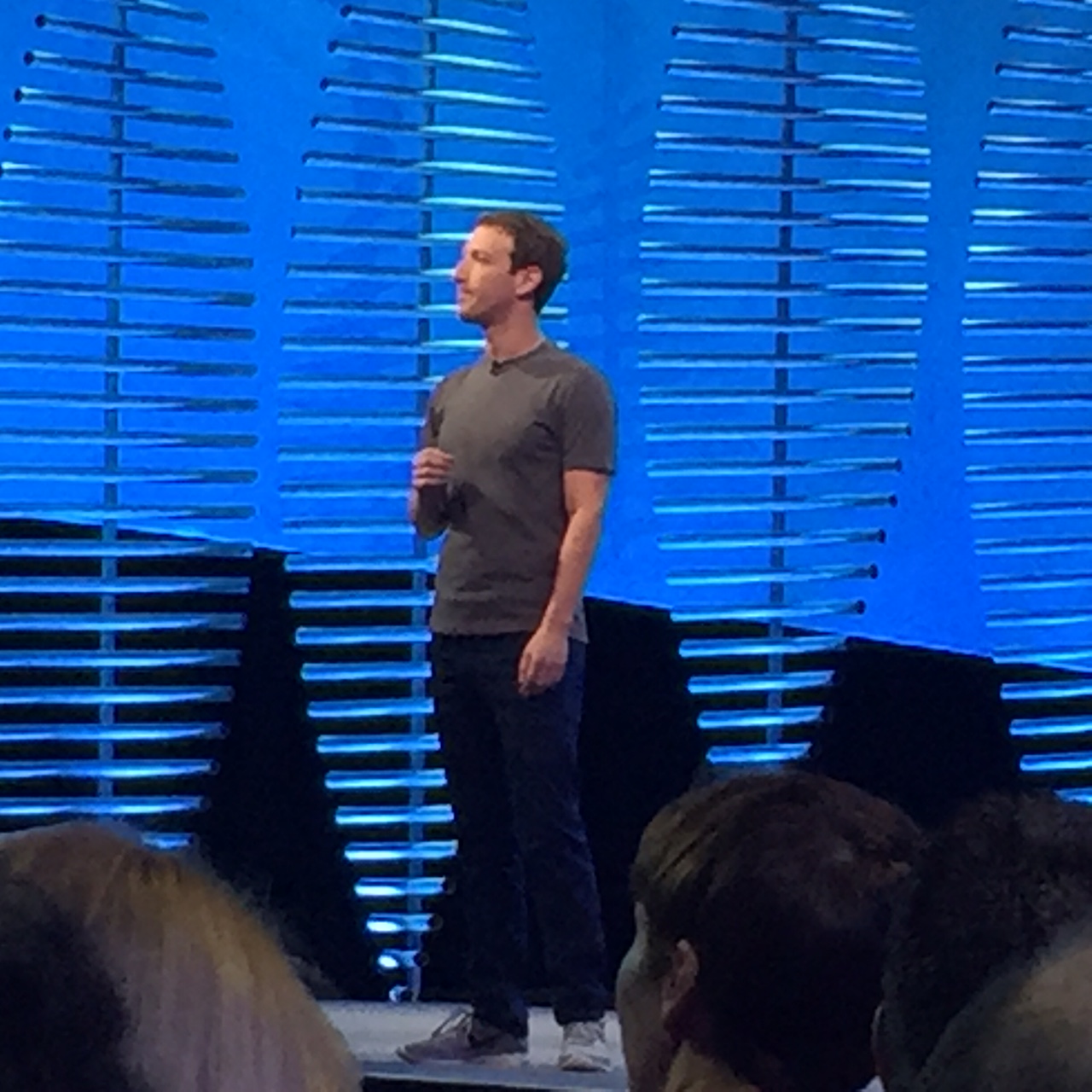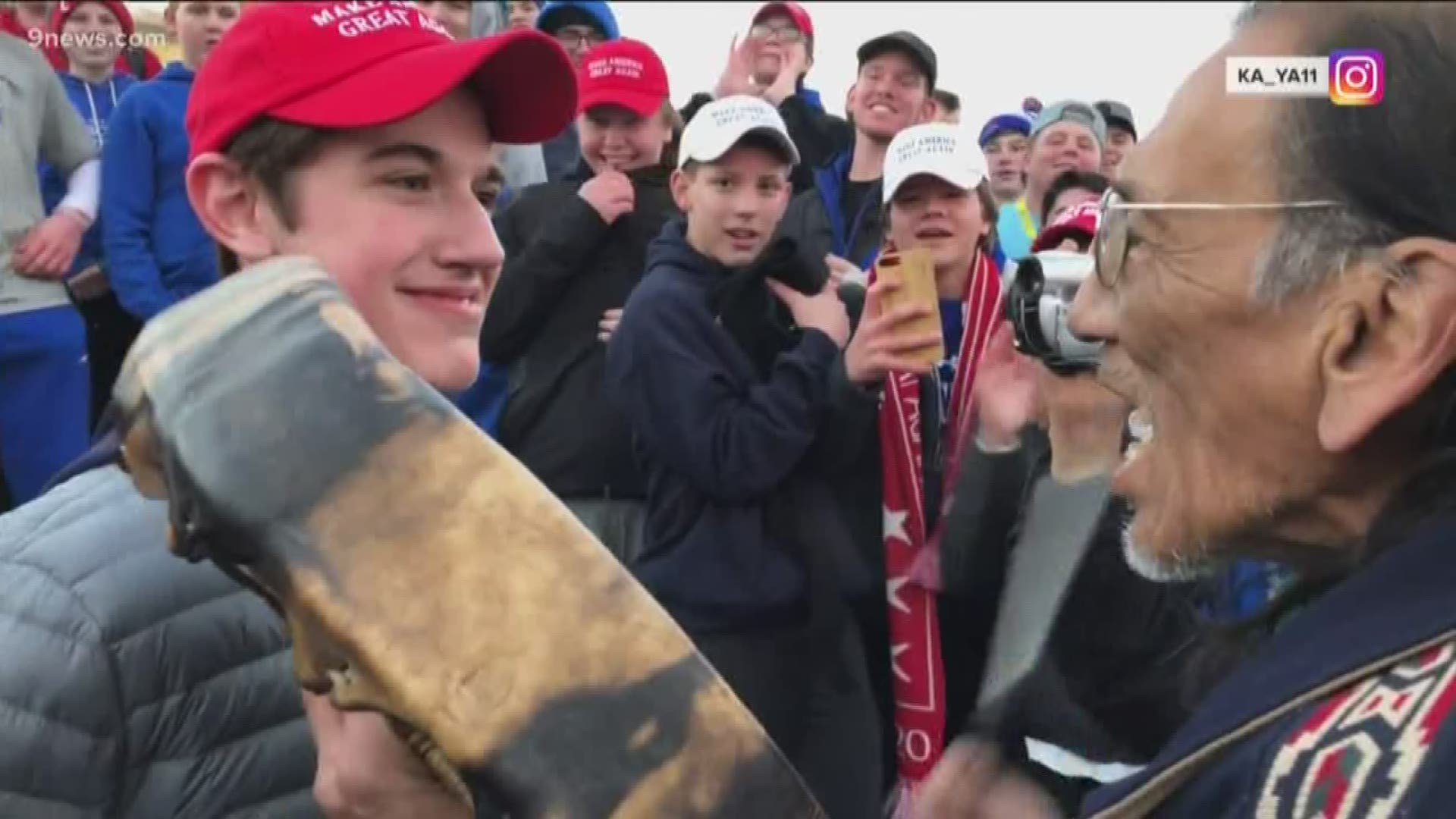SAN FRANCISCO — Curmudgeonly reporters rarely agree on most things — unless, of course, it involves skepticism or a rags-to-riches-to-rags story.
But a funny thing happened after Mark Zuckerberg offered a crisp, 30-minute treatise on Facebook's master plan at the company's F8 developer conference on Tuesday. There was agreement among the press that the 31-year-old co-founder is at the top of his game, and so is his company.
Displaying the confidence of a leader who knows where his company and the future is headed, Zuckerberg delivered a vision that illustrates why Facebook has 1.6 billion users and a hurricane-like wind at its back. Breaking tradition from most tech companies, which favor annual overviews, Zuckerberg laid out an unprecedented 10-year plan.
Facebook is proposing to connect the half of the planet's 7 billion people without Internet access, and deepening the connections with those that do, through an arsenal of virtual and augmented reality, artificial intelligence, drones, bots, live video and its Messenger platform. The visionary (yes, he merits that description) behind it all, Zuckerberg, has fit the pieces together in a digital mosaic that should have the undivided attention of Google, Apple, Amazon and others.
"Amazing," said Johnny Li, general manager of international business development at Cheetah Mobile, a mobile-app developer that attended F8. "From my perspective, it really made their own social ecosystem much more long-term" and, compared with Google, "much more close to reality."
Cheetah, Li noted, has 1- to 3-year and 3- to 5-year plans.
"It was a nicely threaded speech of specific products for a grand plan," added Christian Brucculeri, CEO of Snaps, which makes chatbots and emoji keyboards for three computing platforms: Facebook, Apple and Google.
What's next?
Make no mistake: Zuckerberg’s vision to connect the world isn’t entirely altruistic. More customers mean more advertisers, and potential billions in revenue, for a company valued at about $325 billion.
And Facebook’s world-domination plan won't always be welcomed with open arms abroad.
Regulators in India last year suspended Facebook’s Free Basics initiative, which provides Internet access through simplified phone applications, on the grounds mobile phone companies should not be allowed to “'shape the users’ Internet experience” by providing free access only to certain services.
Still, Zuckerberg has adroitly pieced together a futuristic jigsaw puzzle that is unusual in the Silicon Valley parlor game of, what's next?
Secretive Apple keeps the dates of its product launches — in March and September — closely guarded and remains tight-lipped about its devices until they are unfurled onstage. (No time frame on the long-rumored Apple Car, for instance.)
Google trumpets out-sized projects such as driverless cars, Project Fi and Google Glass as part of a corporate narrative to fire up developers and intrigue consumers — even if some of those projects are radically scaled back.
Microsoft last year offered a taste of the future with a surprise demo of HoloLens, its holographic headgear. But, like many traditional tech giants, it provides a 12- to 18-month blueprint of its product playbook.
Chip makers Intel and Nvidia provide 5- to 10-year product road maps to offer supply chains guidance and to pique interest among customers and business partners. But those projections usually involve bumps in chip speed and capacity.
Of course, companies are loathe to make long-term plans public out of fear the fast-moving tech market will change dramatically or their products won't pan out. Hello, Google Glass.
Risk is inherent, especially when you consider the business climate in 2026, when Zuckerberg's long-range vision culminates, will be after two more presidential elections. Indeed, Facebook showed a pair of VR glasses that some immediately dubbed Facebook Glass.
The specificity with which Zuckerberg outlined his plan, however, could make it a difference maker among tech giants and give it a competitive edge in emerging markets, analysts say.
"Facebook showed it has the research capability in its Day 2 keynote (from chief technology officer Mike Schroepfer)," said Brian Blau, an analyst at market researcher Gartner.
![Facebook F8 Wrapup--the event as theater by USA TODAY Talking Tech [oembed : 83080878] [oembed : 83080878] [oembed : 83080878] [oembed : 83080878] [oembed : 83080878] [oembed : 83080878] [oembed : 83080878] [oembed : 83080878] [oembed : 83080878] [oembed : 83080878]](/Portals/_default/Skins/PrestoLegacy/CommonCss/images/smartembed.png)
Facebook's bold plan, to connect every person on the planet, underscores an evolving philosophy that includes an acquisition spree (Instagram, WhatsApp, Oculus), operations that make money (overseen by Chief Operating Officer Sheryl Sandberg) and a mastermind who deeply understands Facebook's culture and DNA (Zuckerberg).
Ex-Googler Regina Dugan, who worked on "moonshot" projects there, has been tasked with overseeing a research-and-product-development group called Building 8 to develop technologies that include virtual and augmented reality and artificial intelligence. (Facebook says its AI platform cranks out 6 million predictions per second.)
![Facebook hires Google 'moonshot' exec for R&D [oembed : 83031886] [oembed : 83031886] [oembed : 83031886] [oembed : 83031886] [oembed : 83031886] [oembed : 83031886] [oembed : 83031886] [oembed : 83031886] [oembed : 83031886] [oembed : 83031886] [oembed : 83031886] [oembed : 83031886] [oembed : 83031886] [oembed : 83031886] [oembed : 83031886] [oembed : 83031886] [oembed : 83031886] [oembed : 83031886] [oembed : 83031886] [oembed : 83031886] [oembed : 83031886] [oembed : 83031886]](/Portals/_default/Skins/PrestoLegacy/CommonCss/images/smartembed.png)
The possibilities are downright tantalizing. Joaquin Quinonero Candela, director of Facebook's Applied Machine Learning, described to USA TODAY a forthcoming application in which the blind get audio descriptions as they scan their fingers across photos and videos on their Facebook account.
"Video will go from person-to-person to any format for any properly produced content," Gareth Capon, CEO of Grabyo, Facebook's official video partner, said, describing another Facebook gambit in live video. "It is a fascinating way to scale live audiences and attract (financial) partnerships."
It's a bit mind boggling when you flash back a few years, when skepticism over Facebook's mobile strategy and competitive future was rampant. Questions lingered about the business acumen and leadership credentials of Zuckerberg. That was all but dispelled Tuesday at Fort Mason Center, site of F8.
Zuckerberg's soaring confidence this week — he wrote the polished speech and presented it flawlessly — was not only commanding but tinged with political undertones about inclusion and tolerance of cultures. In short, Zuckerberg has become the face and voice of the tech community. For the foreseeable, and distant, future.
![What do Developers Think of Messenger Bots? [video : 82969928]](http://videos.usatoday.net/Brightcove2/29906170001/2016/04/29906170001_4843218902001_4843043287001-vs.jpg?pubId=29906170001)
Follow USA TODAY San Francisco Bureau Chief @jswartz


![635960748427908190-IMG-1510.JPG [image : 82948840]](http://www.gannett-cdn.com/media/2016/04/12/USATODAY/USATODAY/635960748427908190-IMG-1510.JPG)
![635960917547690816-IMG-1517.JPG [image : 82960468]](http://www.gannett-cdn.com/media/2016/04/12/USATODAY/USATODAY/635960917547690816-IMG-1517.JPG)
